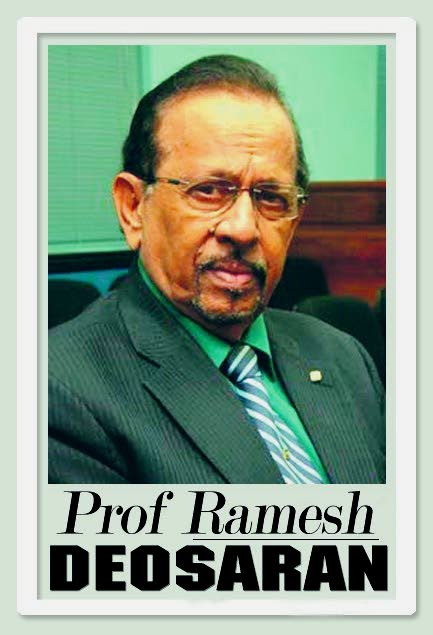Concordat strikes back

Professor Ramesh Deosaran
Don’t make the Concordat a scapegoat for the failures in the education system.
This was one of 12 issues raised by a retired school supervisor and a group representing five denominational school boards (DSBs) at a TV Jaagriti panel discussion last Monday night. The theme was Crisis in Education.
The panel raised several educational issues which have been bounced around for a long time, some without helpful resolution. The DSBs in striking mood comprised Sanatan Dharma Maha Sabha (SDMS), Anglican, Anjuman Sunnat-ul-Jamaat Association (ASJA), Presbyterian and Arya Pratinidhi Sabha (APS).
Given mounting criticisms of the Concordat and its socio-economic implications, it was overdue for denominational boards to explain their role and functions in our dual system of education. And last Monday night they did.
The other 11 issues they raised were:
1. Their privilege to select 20 per cent of the SEA passes is justifiable, given their property ownership, self-help contributions and the right to preserve the religious and spiritual character of their schools. The government selects 80 per cent.
2. Their schools are able to maintain high levels of student discipline mainly because of the manner in which they manage their schools.
3. The Concordat is an agreement – legal, not a MOU.
4. The consultations initiated by the Ministry of Education should have included the school boards as priority.
5. Some denominational schools become “prestige” schools because of teachers’ commitment and parents’ support.
6. Avoid weakening the successful denominational schools, but raise the standards of non-performing schools.
7. Zoning students’ intake will be divisive, deepening educational inequity.
8. The Ministry of Education’s premature use of the Concordat and the SEA as consultation topics was a misdirected approach.
9. Compared to government schools, denominational schools are significantly under-funded.
10. Examine the factors that contribute to the success of “prestige” schools and insert these factors into non-performing ones.
11. Staff assessment has become ineffective, while school supervision and quality controls have lapsed.
These 12 issues should be part of the ongoing national discussion on educational reform. I reference them to assist in this direction.
Complaining about “unfair criticisms” against the Concordat and the boards, acting secretary generalof the SDMS Mr Vijay Maharaj and ASJA board official Mr Rahimool Hosein said the “armchair theorists” do not really understand how the dual system works.
Mr Vickram Ramlal (Presbyterian board) indicated Section 4 of the Constitution protects the Concordat.
Secretary of the APS board Mr Ravi Rambarran said it would be disastrous for government to reduce all schools to the “lowest common denominator.”
Canon Steve West (Anglican School Board) asked for research to measure and transfer “best practice” in high-performing schools to low-performing schools.
To this, SDMS legal adviser and Chaguanas West MP Mr Dinesh Rambally wondered whether such “transfer” could be done, given the cultural and parental factors involved.
Parents and SEA students express strong first-choice preference for high-performing schools, giving less regard to religious status of the school. Religion becomes a matter of happy coincidence. Of course, since “prestige” schools attract the brightest at Form One, national scholarships follow. Tensions arise through SEA performance, the Constitution (the right of a parent to provide a school of his own choice), the Education Act (no person shall be refused admission to any public school on account of religion, race, social status or language) and the principals’ 20 per cent discretion.
Several unsuccessful attempts have been made to reform the untidy connections between the Constitution, Concordat, the Education Act and less so, the Teaching Service Commission (TSC), leaving room for access to the Equal Opportunity Commission.
Some smoothing is now required. Apart from “ownership and direct management over their schools,” DSBs have a right to object to any “appointment or promotion of primary school teachers on moral or spiritual grounds.”
This criterion has always been troubling to the TSC. A particular case in 1990 involved a teacher who was promoted by the commission to principal but faced objection by the Presbyterian board on “moral and spiritual” grounds. The judge ruled in favour of the commission. At the same time, he accepted the operations of the Concordat as “law through settled practice.” This case is worthy of further attention.
(Prof Deosaran is former chairman of the JSC to inquire into Service Commissions and member of the Teaching Service Commission)

Comments
"Concordat strikes back"